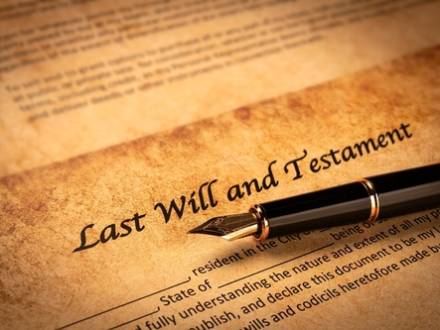When Should a Beneficiary of a Will Have a Lawyer?
 Being named as a beneficiary in a loved one’s will can open the door to many questions. What is probate? What are your rights during the process? Is the executor treating you fairly? Beneficiaries in Illinois have specific legal protections, but those rights can only be enforced if you know how the process works and take action when needed. If you are unsure where to begin, our Arlington Heights, IL beneficiary representation lawyers can help. With legal counsel, you have someone to walk you through the process and ensure that no one violates your rights.
Being named as a beneficiary in a loved one’s will can open the door to many questions. What is probate? What are your rights during the process? Is the executor treating you fairly? Beneficiaries in Illinois have specific legal protections, but those rights can only be enforced if you know how the process works and take action when needed. If you are unsure where to begin, our Arlington Heights, IL beneficiary representation lawyers can help. With legal counsel, you have someone to walk you through the process and ensure that no one violates your rights.
What Does It Mean To Be a Beneficiary of a Will in Illinois?
A beneficiary is legally entitled to receive property or assets after another person’s death. This can include money, real estate, investments, or personal items. The will must be submitted to the local probate court. Probate is the legal process used to validate a will and distribute assets to beneficiaries after all debts have been paid. There, it becomes part of a public record, and the executor carries out the deceased person’s final wishes.
The probate process usually takes place in the county where the deceased person lived. During this process, you have the right to receive notice of important court filings, view a copy of the will, and receive an accounting of all assets and debts. You also have the right to object if something seems wrong, such as assets being sold without approval or missing from the inventory.
Even when everyone seems to get along, having your own attorney is the best way to protect your interests. Estate administration can involve tax filings, property appraisals, and debt settlements. A lawyer will review all documents to make sure the executor properly handles your inheritance.
Do Beneficiaries Need an Attorney During the Probate Process?
You may not always need a lawyer for basic probate matters, especially if the estate is small or uncontested. However, many cases involve complicated issues such as hidden assets, unclear language in the will, or conflicts among heirs. If you are dealing with a complex estate, keep in mind that creditors have the right, under 755 ILCS 5/18-1, to make claims against it. This can affect how much you ultimately receive.
Some specific things your attorney will do to support you include:
-
Reviewing the executor’s reports to ensure accuracy
-
Identifying any mismanagement or suspicious transactions
-
Filing objections in probate court if the executor violates their duties
-
Helping you understand when taxes or debts must be paid before distributions are made
-
Ensuring that all assets are properly valued and distributed according to the terms of the will
The probate process can take months or even years. Mistakes can delay everything. By having your own legal counsel, you reduce the risk of losing time or money due to errors made by others.
What if You Believe the Executor is Mishandling the Estate?
Executors are expected to act in the best interests of all beneficiaries. They have what is known as a fiduciary duty, meaning they must be honest, transparent, and careful with estate property. If the executor violates their duties, they can be held personally liable.
Examples of executor misconduct include:
-
Failing to pay taxes or debts before distributing assets
-
Keeping poor records or refusing to share information
-
Favoring one beneficiary over another
-
Using estate funds for personal benefit
-
Unreasonably delaying distributions or ignoring court deadlines
-
Failing to provide timely updates or respond to beneficiary inquiries
-
Selling estate property without notice or proper authorization
Under 755 ILCS 5/23-2, beneficiaries may petition the court to remove an executor for cause, such as mismanagement, neglect, or fraud. Your attorney can help you file this petition and request an independent accounting. You may also ask the court to freeze estate funds until a full review is completed.
When Should You Hire a Lawyer To Challenge a Will in Illinois?
You may need to challenge a will if you suspect that it was not created voluntarily or does not reflect the true wishes of your loved one. This often happens in cases involving undue influence, lack of mental capacity, or forgery. Under 755 ILCS 5/8-1, you have six months after the will is admitted to probate to file a formal will contest.
A lawyer can help you gather the evidence needed to prove your claim. This may include medical records showing that the deceased lacked capacity, witness statements about suspicious circumstances, or evidence of fraud.
Contesting a will can be emotionally and financially difficult. Your attorney can help you decide whether the evidence is strong enough to move forward and guide you through mediation or litigation if necessary.

How Can a Lawyer Protect You From Estate Disputes Among Family Members?
Family conflict is one of the most common challenges during estate administration. Disagreements over money or sentimental items can quickly turn emotional and divide families. A lawyer provides an objective perspective and helps you navigate these disputes in a structured way.
Your attorney can communicate directly with other beneficiaries or the executor to prevent misunderstandings. They can help negotiate fair solutions that reflect both the law and the wishes of the deceased. If necessary, your lawyer can represent you in probate court and ensure that all filings, accountings, and distributions comply with Illinois law. By taking emotion out of the process and focusing on facts and procedures, your lawyer helps protect your rights while minimizing family tension.
Contact an Arlington Heights, IL Beneficiary Representation Attorney
If you are unsure of how to proceed with doubts about a loved one’s will, we can help. At A. Traub & Associates, we offer clients the balance of aggressive legal representation and thoughtful guidance, helping families navigate even the most complex estate matters with care.
To learn more about your rights, call 630-426-0196 to schedule a consultation with an Arlington Heights, IL beneficiary representation lawyer you can trust. We take the time to understand your unique experiences and perspective, allowing us to provide a personalized strategy tailored to your specific legal needs.












